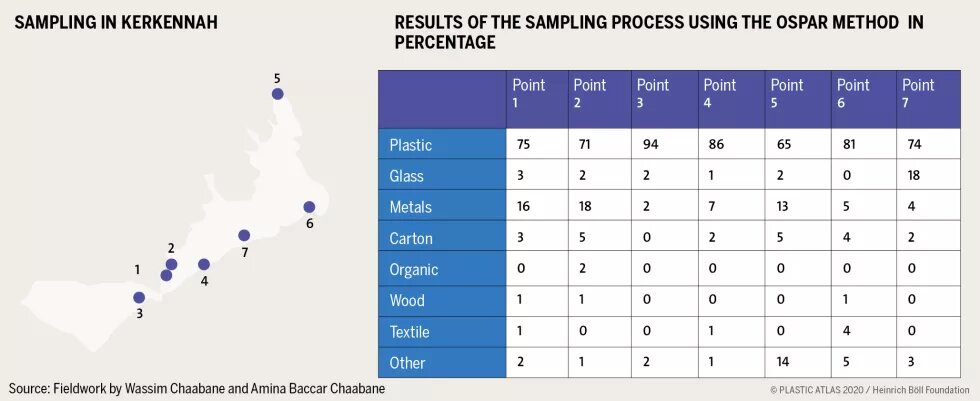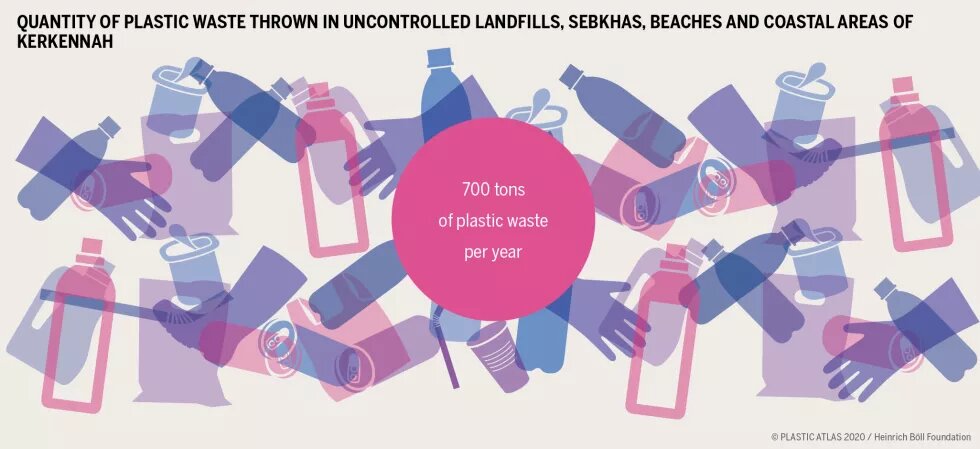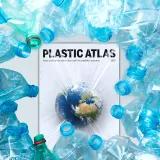
Tunisia, with its sixty islands and islets overlooking the coast, suffers from a plastic plague that causes pollution that looms as far as the eye can see.

The island of Djerba, which hosts 117 hostels, is unique for its mass seasonal tourism, and it is a tourist destination of great importance, as the island received nearly 1.870 million tourists in 2018. However, this characteristic of being a tourist attraction has led to great pressure on the environment and natural resources. According to the municipality of Midoun and Houmet Souk, the volume of waste generated by hotels ranges between 35 and 40 percent of the total amount of waste that Djerba discharges annually, while plastic represents 11 percent of this waste.
The excessive production of waste, especially in the summer season, leads to an increase in plastic waste that scatters in nature and on beaches. This phenomenon intensified, especially after the closure of the controlled landfill in the Guellala area in 2012 and the disruption in the municipal system for waste collection. In the absence of a sustainable solution and a clear vision to solve the problem on the island of Djerba, the baling system that was proposed as a temporary solution in 2014 ended in April 2019 without preparing the ground for a lasting solution for waste treatment.
The cost of environmental degradation caused by domestic waste on the island of Djerba reached TND 14.1 million in 2014, which is equivalent to 1.1 percent of the gross national product of the island and 0.02 percent of the gross national product of Tunisia in 2014. Furthermore, the loss of opportunities that may have presented additional sources of revenue to the municipal budgets and to the public treasury (recycling, etc.) amount to TND 3.7 million (according to SWEEP-NET).
While the selective sorting process in hotels seems to be a simple matter in touristic islands, given that the various departments sort different kinds of waste, making the process a common practice requires proper organization and effectiveness by the involved actors to ensure achieving the desired results.
A positive factor is that waste sorting benefits the hotel sector. It enables reduction in waste collecting cost, backfilling and investing in technologies for waste recovery. It also creates new opportunities for waste collection and recycling companies and for tourism companies to obtain a trademark and environmental accreditation at the national and international levels.
In this context, the Ministry of Local Affairs and Environment launched a project in 2018 that aims at starting the selective sorting at source in the entire island of Djerba, targeting the hotel and restaurant sector and the three municipalities of Djerba. While the communication plan of the selective sorting at source is being conducted, the operational aspect is still under discussion and very little progress has been noticed to date.
In parallel, pilot projects with a participatory approach were launched by the association of Amal Ghizen in 2019, aiming at raising awareness among citizens in the villages of Mezraya, Cedghiana and Guichaine in Houmet Souk in Djerba.
Kerkennah is an archipelago, with a perimeter of 160 kilometers, located about 20 kilometers away from Sfax. The island is hit hard by climatic change and is subject to a rising sea level and increased coastal erosion. In addition to this, the plastic problem has emerged in the last few years as a serious problem threatening the island and its marine ecosystem.
The number of visitors increases during the tourist season leading to an increase in the volume of waste, which is estimated at 15 tons per day in the winter season, and from 30 to 35 tons per day in the summer. The waste collected on the island is buried in five random dumpsites due to the closure, for real estate reasons, of the Mellita controlled landfill, which was built since 2010. Likewise, the national system for the collection of recyclable materials “Eco-lef” suffers from mismanagement on Kerkennah Island as the volume of plastic has been limited in 2018 to only 7 tons (PET and PEHD), which corresponds to the amount collected by the private sector that operates outside Eco-lef.
Kerkennah Municipality lacks the financial and logistical resources to clean the coasts of the island, which is characterized by the scarcity of sandy beaches, which renders mechanical cleaning difficult. In order to identify the waste on the beaches of the Kerkennah Islands, sampling campaigns were conducted in the summer of 2019 on seven beaches of the Kerkennah Islands, using a method called OSPAR over a line of 100 meters from the shore of each station.
The identification process of the waste on the coasts of Kerkennah shows that plastic is the dominant material in all sample sites and is mainly represented in plastic bottles, caps and SUPBs, in addition to the strong presence of fishing waste, notably plastic nets and traps.
Today, there are many plastic fishing equipment such as nets and traps that fishermen lose or neglect, which leads to pollution of the sea, the decline of the beauty of the beaches, and harm to animals and plants to a fatal degree at times. The cheaper and more resistant plastic traps that are replacing traditional palm leaf traps are the best example of the rising dominance of plastic over fishing gear in Kerkennah and other coastal regions of Tunisia. These new equipment are usually manufactured by the fishermen themselves and then abandoned at sea after use for a certain time. Consequently, the plastic breaks down into fine particles causing the death of several marine mammals and fish.
According to the Food and Agriculture Organization (FAO), if the net is abandoned or lost at sea, it can continue fishing on its own for a period of months or sometimes years, killing an endless number of fish and other animals, especially since these nets need 600 years to completely disintegrate.
This pollution may have a serious impact on tourism and on the image of the place. Plastic pollution may also lead to contamination of the food chain when fish, plankton, and filtering organisms such as shellfish, ingest plastic particles.
In order to ensure the efficiency and sustainability of waste management in the Tunisian islands, dynamic strategies that take into account the location should be pursued. Additionally, the infrastructure for treating, evaluating and burying the waste collected on the islands should be prepared to carry out selective sorting at source.
The costs of waste management should be reviewed for all stakeholders to contribute to financial support for the authorities. The collection and recycling infrastructure on the islands should also be strengthened to support these activities. Given the high price of transportation, the State should support this activity to encourage small companies active in the sector and ensure their sustainability.
As for the Kerkennah Islands, where the plastic collection by the “Barbecha” is weak, the development of a system for recovering plastic bottles would represent a solution to increase the collection rate.
This is a chapter from the Plastic Atlas 2020.
